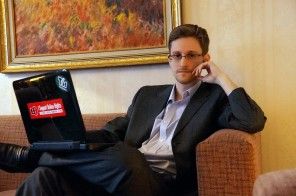 Edward Joseph Snowden, former U.S. National Security Agency (NSA) consultant, says his “mission’s already accomplished” because he “wanted to give society a chance to determine if it should change itself.” In an exclusive interview given to "The Washington Post" on December 23, he said: “All I wanted was for the public to be able to have a say in how they are governed.”
Edward Joseph Snowden, former U.S. National Security Agency (NSA) consultant, says his “mission’s already accomplished” because he “wanted to give society a chance to determine if it should change itself.” In an exclusive interview given to "The Washington Post" on December 23, he said: “All I wanted was for the public to be able to have a say in how they are governed.”
Snowden offered vignettes from his intelligence career and from his recent life as “an indoor cat” in Russia. But he consistently steered the conversation back to surveillance, democracy and the meaning of the documents he exposed.
“For me, in terms of personal satisfaction, the mission’s already accomplished,” he said. “I already won. As soon as the journalists were able to work, everything that I had been trying to do was validated. Because, remember, I didn’t want to change society. I wanted to give society a chance to determine if it should change itself.”
“All I wanted was for the public to be able to have a say in how they are governed,” he said. “That is a milestone we left a long time ago. Right now, all we are looking at are stretch goals.”
Snowden is an orderly thinker, with an engineer’s approach to problem-solving. He had come to believe that a dangerous machine of mass surveillance was growing unchecked. Closed-door oversight by Congress and the Foreign Intelligence Surveillance Court was a “graveyard of judgment,” he said, manipulated by the agency it was supposed to keep in check. Classification rules erected walls to prevent public debate.
Just before releasing the documents this spring, Snowden made a final review of the risks. He had overcome what he described at the time as a “selfish fear” of the consequences for himself.
“I said to you the only fear [left] is apathy — that people won’t care, that they won’t want change,” he recalled this month.
Six months ago, a reporter asked him by encrypted e-mail why Americans would want the NSA to give up bulk data collection if that would limit a useful intelligence tool.
“I believe the cost of frank public debate about the powers of our government is less than the danger posed by allowing these powers to continue growing in secret,” he replied, calling them “a direct threat to democratic governance.”
In the Moscow interview, Snowden said, “What the government wants is something they never had before,” adding: “They want total awareness. The question is, is that something we should be allowing?”
According to senior intelligence officials, two uncertainties feed their greatest concerns. One is whether Russia or China managed to take the Snowden archive from his computer, a worst-case assumption for which three officials acknowledged there is no evidence.
In a previous assignment, Snowden taught U.S. intelligence personnel how to operate securely in a “high-threat digital environment,” using a training scenario in which China was the designated threat. He declined to discuss the whereabouts of the files, but he said that he is confident he did not expose them to Chinese intelligence in Hong Kong. And he said he did not bring them to Russia.
He is an “ascetic,” he said. He lives off ramen noodles and chips. He has visitors, and many of them bring books. The books pile up, unread. The Internet is an endless library and a window on the progress of his cause.
Former NSA and CIA director Michael V. Hayden predicted that Snowden will waste away in Moscow as an alcoholic, like other “defectors.” To this, Snowden shrugged. He does not drink at all. Never has.
But Snowden knows his presence here is easy ammunition for critics. He did not choose refuge in Moscow as a final destination. He said that once the U.S. government voided his passport as he tried to change planes en route to Latin America, he had no other choice.
“There is no evidence at all for the claim that I have loyalties to Russia or China or any country other than the United States,” he said. “I have no relationship with the Russian government. I have not entered into any agreements with them.”
“If I defected at all,” Snowden said, “I defected from the government to the public.”
 В Атырау -10
В Атырау -10